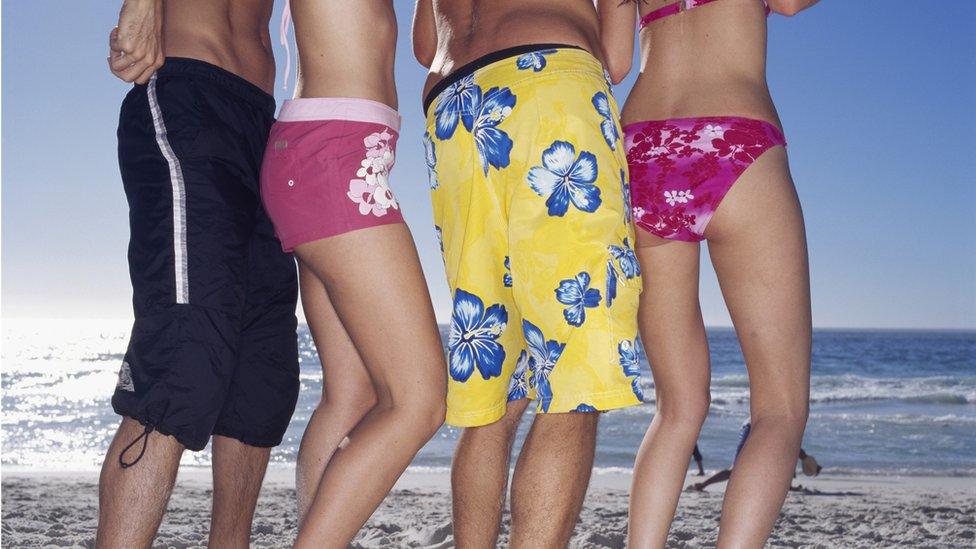The women who invented the Brazilian wax
- Published
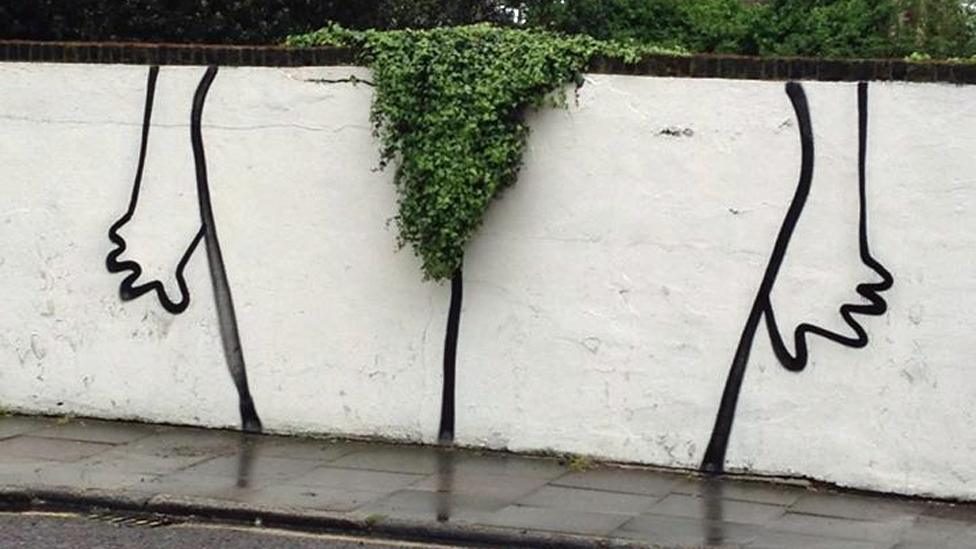
Waxing pubic hair has become increasingly common, but how did the trend for the "Brazilian" wax begin?
In an office toilet in London, young women discuss their grooming regimes. Jennifer, 19, waxes off all her pubic hair every month. "The pain is the worst thing I've ever been through, but I'm kind of used to it now," she says.
"I prefer the underneath being gone," says Lisa, 27. "Some people wax for the beach and other people wax for boys, and people who wax for boys wax the underneath."
Ever since Sex and the City tackled the subject, what women do with their pubic hair - trim, shave, pluck, wax or let it all hang out - has become a topic for discussion. And scientific research.
Studies show that pubic hair grooming is becoming increasingly common. Earlier this year researchers reported in JAMA Dermatology, external that 84% of the American women who took part in their survey had done some grooming, with 62% removing all of their pubic hair. Younger women were much more likely to groom than the over-40s.
An earlier study in the Journal of Sexual Medicine, external linked the phenomenon to the availability of pornography. This same study suggested that the trend originated in South America - "hence the term Brazilian as slang for complete pubic hair removal".
But that is not the whole story.
"The Brazilian bikini wax was born here in New York, not Brazil," says Jonice Padilha, of the J Sisters salon in Manhattan, which pioneered the treatment in the early 1990s.
A Brazilian wax involves removing all the pubic hair from underneath and leaving some hair at the front for decorative purposes - perhaps a triangle, a thin "landing strip" or a heart-shape, that's up to the customer. "It's a freedom for you to have whatever you want," she says.
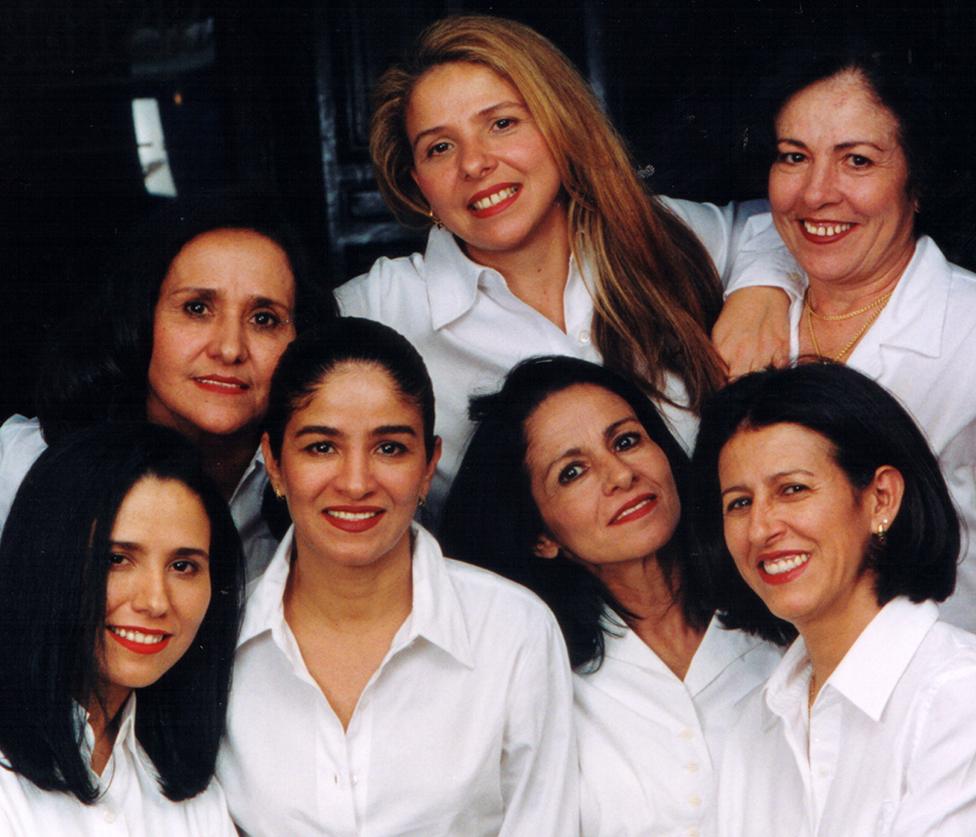
Jonice is the youngest of seven Brazilian sisters whose names all begin with J - the others are Jocely, Janea, Joyce, Juracy, Jussara and Judseia. They became known collectively as the J Sisters because nobody could get all the names right. Today the salon is popular with the rich and famous, and they make up to $6m a year on waxing, hair and nail treatments. But it had humble beginnings.
"It's an inspirational story of self-made women who came from nothing, illegal immigrants who made it in America," says Laura Malin, author of Wax and the City, a forthcoming book about the J Sisters. "It's the American dream."
Find us on Facebook , external
The sisters come from the small coastal town of Vitoria, which lies between Rio and Bahia. They grew up in a large family - seven sisters and seven brothers - and in a traditional, macho culture. Their father forbade them from going out unchaperoned, and was afraid it wasn't safe for them to work for other people, Jocely says.
But when he went bankrupt, his daughters began to bring in money by offering beauty treatments in their back yard. Eventually they became the main breadwinners, and ran three salons in the town. "After school I used to hang out in the salon, instead of going to friends' houses," says Jonice.
In such a traditional household, it seemed that the only way to leave home was to get married, but Jocely, the fourth sister, dreamed of seeing the world. She saved up and in 1982 went to New York to visit an old neighbour from Vitoria. She planned to stay for a month, but the few hundred dollars she had brought ran out in a matter of days. She faced a choice: fly home or start earning.
She could have been in trouble. "New York was a lot more violent then and many Brazilian women were prostitutes, so there was this prejudice," says Malin. Luckily, Jocely had skills.
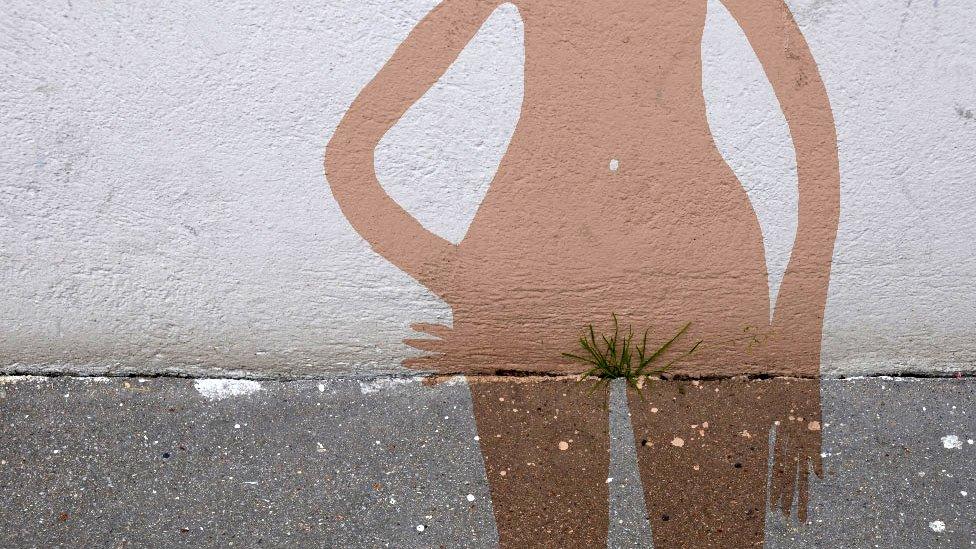
Street art by Sandrine Boulet shows a female contour drawn around grass on a pavement

Find out more
Why do so many women feel the need to get rid of their body hair? Listen to The Why factor: Female body hair
Why do we have armpit hair and pubic hair? Listen to The Curious Cases of Rutherford & Fry: Hair

She spoke no English, but found a job at a nail salon run by a Portuguese woman. At the time the fashion was for stick-on acrylic nails which would be removed weeks later, leaving quite a bit of damage. Jocely's focus was on restoring the nail's natural health and lustre. Her reputation for manicures spread and she attracted a powerful customer - Adnan Khashoggi. The arms-trade magnate would book her for the entire day, at a rate of $100 an hour, so he could have manicures between meetings. Through him she met many influential people, from stars such as Brooke Shields and Rod Stewart to the editors of fashion magazines like Elle and Marie Claire.
Soon she was earning well and, one by one, her sisters came over to join her. Jonice was the second to come to New York. She was dazzled. "It was when I arrived here that I realised Brazil was Third World," she says. "We knew nothing."
In 1987 the sisters opened their first nail salon on 57th St between 5th and 6th Avenue, then considered a fairly undesirable location. People thought they were crazy, says Jonice. At the time you didn't need a licence to run a nail salon so it was the obvious place to start, but they had other beauty secrets to impart. A few years later, at the start of the '90s, they began offering their - as yet unnamed - extreme bikini wax. It removed all pubic hair from below, not just at the sides.
Their signature wax had been invented by their sister Janea. "It's a funny story actually," says Malin. Back in the late '70s Janea was in Bahia with her husband, having a beer and some fried fish on the beach. She was admiring a beautiful girl, but as she walked past Janea was horrified by the pubic hair protruding from the back of her tiny bikini. "The image - it was like a mirror that shattered," says Malin.
Janea's next thought was: "Wow, do we have hair there?"
At home her suspicion was confirmed. But when she went to a salon to have it removed, she met with resistance: "Are you crazy? I'm not touching you there," was the response.
So Janea decided to do it herself. She locked herself in the waxing booth with a mirror and after about three hours of painful experimentation came out feeling fabulous. Then she convinced her co-workers to do the same. "They were like: 'Oh my god I don't feel ashamed when I'm in bed with men, I don't feel shame when I go to the doctor, I feel cleaner,'" explains Malin.
When they introduced it in New York, their bikini wax became wildly popular. It helped that they still counted the editors of fashion magazines among their customers. "Our only error was not to call it the J Sisters wax," says Jonice.
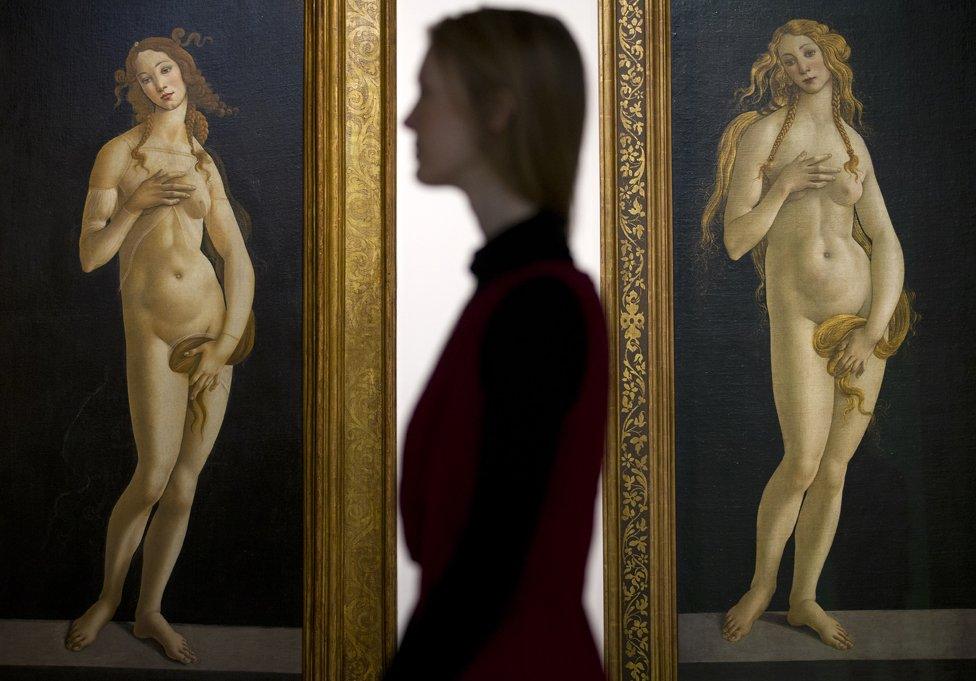
But there was a problem - they were coming under pressure from rivals. The early '90s had seen a boom in online porn, which increasingly featured hairless actors and models. "It's very practical for pornography but it's just very practical for sex," adult film-maker Anna Span told the BBC. Adult magazines such as Playboy and Penthouse, external also showed little or no pubic hair.
Jonice says Playboy called the salon, claiming they had come up with the idea first. "They said: 'This is ours, we do this for the porno site,'" she says. Jonice's defence was to say that it was just what everyone in Brazil did. "I said we were introducing our culture," she says.
"That's why all over the world it's known as a Brazilian. I played it that way so they would leave me alone. But it started here, not there."
People haven't forgotten that the J Sisters were the real pioneers. They were consulted for shows like Gossip Girl and Sex And the City.
"Sarah Jessica Parker came here all the time," says Jocely.
They count many celebrities as close friends.
"They have very intimate relationships with people," says Malin.
"If you spread your legs to a woman then you don't have anything else to hide. I've been there so many times and you end up talking about everything: depression, kids, anal sex... It's crazy and a little bit therapeutic."
As well as Malin's book, a biopic about the sisters is in production in Brazil - a "dramedy", or comic drama, say the producers. "They were very brave to leave this small town in Brazil and go to New York with no money and no English," says Karen Castanho, one of the producers. "They have such energy, I've never met anyone like them."
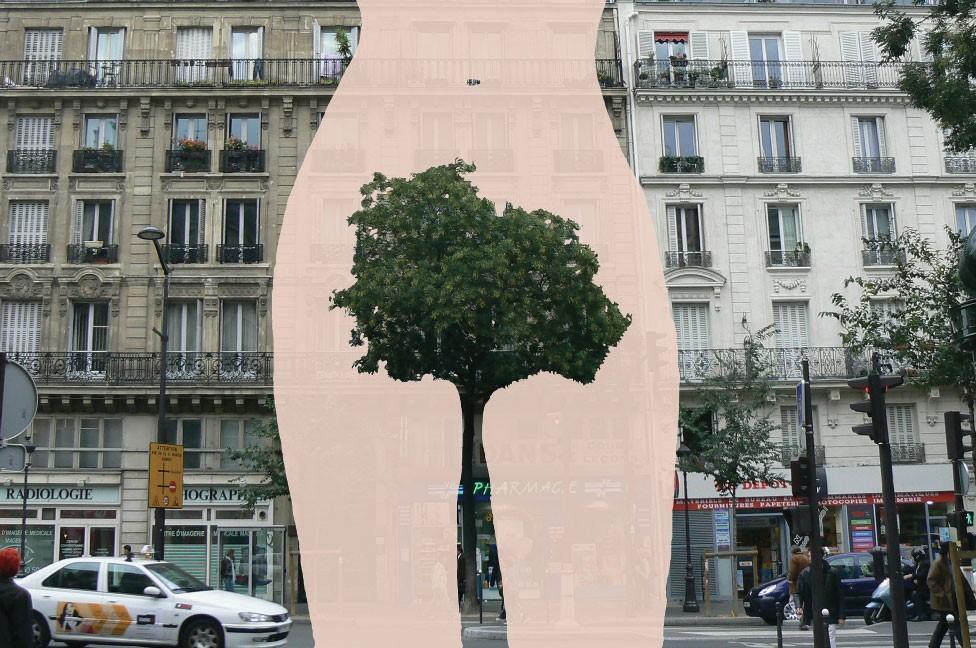
Female body hair is a recurring theme in the work of French street artist Sandrine Boulet
So what does the future hold for the Brazilian wax?
The trend could be on its way out. A recent study has linked pubic grooming to an increase in sexually transmitted infections. The GB cycling team banned bikini waxes during the Olympics because the hair protects against chafing. Even Tatler magazine recently announced, external the return of the natural look.
Back in the London office toilet this, too, has been noticed. "Boys are saying: 'Don't do it, if you shave it all off you look like a baby," says Alex, 23. Her friend Cameron, 21, agrees. "Yes, my friends say they like bush because they feel more mature being with that person."
But the J Sisters always move with the times. For the past 10 years they've been waxing men. And since Jocely discovered her first grey hair down there, the salon can also dye pubic hair, to prevent the kind of home-dying mishaps featured in Sex and the City. One thing's for sure, thanks to their influence this part of the body will never again be neglected.
Some names have been changed.

Join the conversation - find us on Facebook, external, Instagram, external, Snapchat , externaland Twitter, external.
- Published6 December 2016
